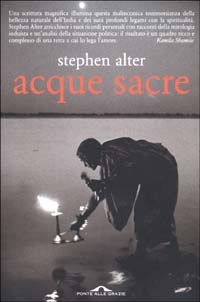Acque sacre
| |||||||||||||||||
|
Editeur - Casa editrice |
Ponte alle Grazie | ||||||||||||||||
|
Anno - Date de Parution |
2002 | ||||||||||||||||
|
Pagine - Pages | 328 | ||||||||||||||||
|
Titolo originale | Sacred Waters | ||||||||||||||||
|
Lingua originale | |||||||||||||||||
|
Lingua - language - langue | italiano | ||||||||||||||||
|
|
|||||||||||||||||
|
|
Amazon.it (Italia) - ordina e ricevi questa pubblicazione Acque sacre |
||||||||||||||||

|
Amazon.com (United States) - order this book Sacred Waters: A Pilgrimage up the Ganges River to the Source of Hindu Culture |
||||||||||||||||
|
|
|
Il Char Dham Yatra Ŕ un pellegrinaggio verso le sorgenti del Gange, il fiume sacro dell'India, intrapreso a piedi ogni anno da milioni di fedeli ind¨. Raramente gli occidentali hanno avuto occasione di parteciparvi o di assistervi da vicino. Non cosý Stephen Alter, che lo fa da una prospettiva insolita e originale. L'autore, infatti, Ŕ un americano che, nato e cresciuto in India, qualche anno fa ha deciso di percorrere quegli stessi sentieri e attraversare quel luoghi sacri nella regione del Garhwal, rinunciando alle comoditÓ del mondo moderno per raggiungere una comprensione pi¨ vera di quella realtÓ.
Recensione in altra lingua (English): |
| Alter crosses many miles, and several millennia, to search for the source of Indian religion. Along the way, he delves into the myths and traditions of an antique land. "Sacred Waters" is a richly told narrative of a beautiful land and of a man's interior journey, and is for readers everywhere who seek to plumb their own spiritual sources. | |||||||||||||
| Recensione in altra lingua (Franšais): | |||||||||||||||||
|
Garhwal, boasting the four sources of the Ganges River in northern India, must qualify as one of the most sacred stretches of land in the world, and novelist Stephen Alter transports us there in his travelogue Sacred Waters. Countless pilgrims make the same trip every year, but whereas they now travel by bus, Alter does it the old-fashioned way, trekking to each of the headwaters on foot. Since this is also Alter's birthplace and childhood stomping grounds, we couldn't ask for a better guide. He knows each species of plant, bird, and beast by name and tells the grand tales of Hindu mythology associated with the ancient terrain. Fluent in the local languages, he also makes us privy to his chats with pot-smoking sadhus, greedy Brahmins, simple nomads, and pilgrims that he meets along the way. Although Alter has the tendency to slip into the emotionless detachment of a journalist in his descriptions, there remains enough wonder at the power of the natural landscape and color in the fantastic myths to make Sacred Waters a trek worth taking. --Brian Bruya | |||||||||||||||||
| Recensione in lingua italiana | |||||||||||||||||
|
Ogni estate, all'apice della stagione dei monsoni, le autostrade tra Hardwar e Delhi vengono chiuse al traffico, per permettere il passaggio di milioni di pellegrini. Sono quasi tutti uomini giovani, che lasciano le famiglie e gli affari per seguire il Gange partendo dalla cittÓ santa di Hardward fino a un tempio pi¨ a valle. Il pellegrinaggio di Alter va nella direzione contraria, verso le sorgenti sacre del Gange. Il percorso Ŕ disseminato di templi e case di accoglienza per i devoti, in gran parte abbandonati perchÚ anche i pii ind¨ preferiscono raggiungere i santuari a bordo di bus sovraffollati e di macchine scassate. | |||||||||||||||||
| |||||||||||||||||




 Acque sacre
Acque sacre